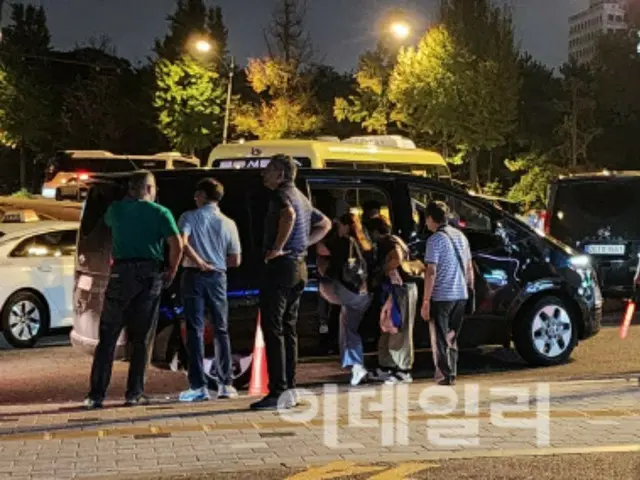Andrea (38), an Italian tourist I met at the station, said this after getting off a black minivan. "I was taking a cable car with my family and going outside.
When it arrived, the driver said it was a taxi, so I got in," he said. "I received 10,000 won per person, a total of 40,000 won (about 4,330 yen), in cash and left."
The Korean government is making efforts to attract tourists, including holding a Foreign Tourist Welcome Week event until the 11th of this month. However, major tourist spots in Seoul are showing signs of welcoming foreigners.
There are many unregistered illegal taxi operators using wagons on the streets. This is a clear violation of the Passenger Vehicle Transport Business Act, but local governments have cracked down on the scene of cash being handed over.
Experts say that illegal transportation businesses are not only an inconvenience for foreign tourists, but can also lead to secondary crimes, and they call for active crackdowns by local governments.
With the autumn leaves season approaching, it was easy to find illegal taxi operators waiting for foreign tourists at the Namsan cable car station.
After waiting for a while, we saw a company pick up a group of tourists in a black station wagon. There was nothing on the outside of the vehicle indicating that it was a taxi. The license plate number of the vehicle was also
The license plate was not a yellow taxi plate, but a regular car plate. The company argued that this was not a taxi business but a "pro bono" service.
The vendor I met at the venue said, "We give foreigners a ride when they say they're going to the city center and we pass by them," and explained, "We don't take a penny for it, it's a free service." However,
When he appeared, he was seen waiting for passengers and picking them up, calling out in English, "Taxi?" and "Cash only."
Operating a taxi business without a license is a clear violation of the Passenger Automobile Transportation Business Act.
Violation of the business law carries a maximum sentence of two years in prison or a fine of up to 20 million won (US$20,000). However, the illegal taxi operators continued to operate illegally every day.
Pyo (39), a parking attendant who has worked at Namsan Cable Car for three years, said, "I see illegal taxis operating every day except when it's raining a lot."
"They've been coming and going dozens of times since noon," he said. There is a free shuttle bus operated by the Seoul Metropolitan Government at the site, which runs between Myeongdong Station and Seoul Station every 30 minutes. However,
Not only foreigners, but even Koreans are not aware of the existence of the shuttle bus, so it is not used very often. However, the shuttle bus stops operating at 8:30 pm.
Since then, tourists visiting Namsan have been subject to illegal taxi solicitation. Parking attendant Pyo said, "The cable car is usually used by many tourists who come at night to see the night view, but at that time,
"The free shuttle bus service will end at 10:00 p.m. during the day," he said, adding, "Even during the day, illegal taxi operators often block the free shuttle bus and pick up passengers, so the shuttle bus has few passengers.
"It is difficult to crack down without evidence," the agency said. Experts said, "We should crack down aggressively." The relevant government agency is not aware of these illegal taxi operations.
An official from Jung-gu Office, which oversees the Namsan Cable Car Station and the Myeongdong area, said, "We know that illegal taxis are operating, but we don't know if they're just exchanging cash."
"We can't crack down on them if we can't stop them from committing these crimes," he said, adding, "Our officers take turns cracking down on them once a week, but the companies know that it's difficult to crack down on them without evidence, so they act with confidence."
"The inconvenience of using taxis for foreign tourists is on the rise. According to the "Comprehensive Analysis of Tourist Inconvenience Reports 2023" published by the Korea Tourism Organization in March,
In a survey conducted last year asking foreign tourists about inconveniences they face, taxi-related issues came in second after "rip-off shopping."
It can be seen that the inconvenience of using a taxi, which previously ranked third, is increasing. First of all, unregistered taxis are different from licensed taxis in that the identification of the operator is insufficient, and there is a risk of secondary crime.
There are also concerns about the number of people who are using the service. In fact, a group of 19 people was arrested in Gyeonggi-do last December for operating unregistered taxis. The group included a man with 16 previous convictions.
In June of this year, police arrested a group of 20 ex-offenders who were operating illegal taxi services using private and rental cars in Seosan, South Chungcheong Province.
Experts agree that the only solution is to crack down aggressively. Jeong Lang-soo, an adjunct professor at Hanyang University's Department of Tourism, said, "Rip-off shopping is a 'miss 100%' phenomenon."
"We are using 'terry shoppers' (fake customers) to secure evidence," he said, adding, "We are cracking down on illegal taxis in various ways, including conducting undercover investigations using foreigners living in Korea."
"It is possible to punish even with indirect evidence, such as testimony from passengers," said lawyer Seo Ah-ram. "It could lead to secondary crimes, so the police should not carry out surprise investigations."
"I think the government needs to take a more proactive approach, such as by setting up checkpoints," he said. A police official said, "The police will investigate illegal taxi operators waiting near the cable car station.
"We were not even aware of it," he said, adding, "We will be deploying plainclothes police and other police to crack down aggressively."
2024/10/02 07:05 KST
Copyrights(C) Edaily wowkorea.jp 107

